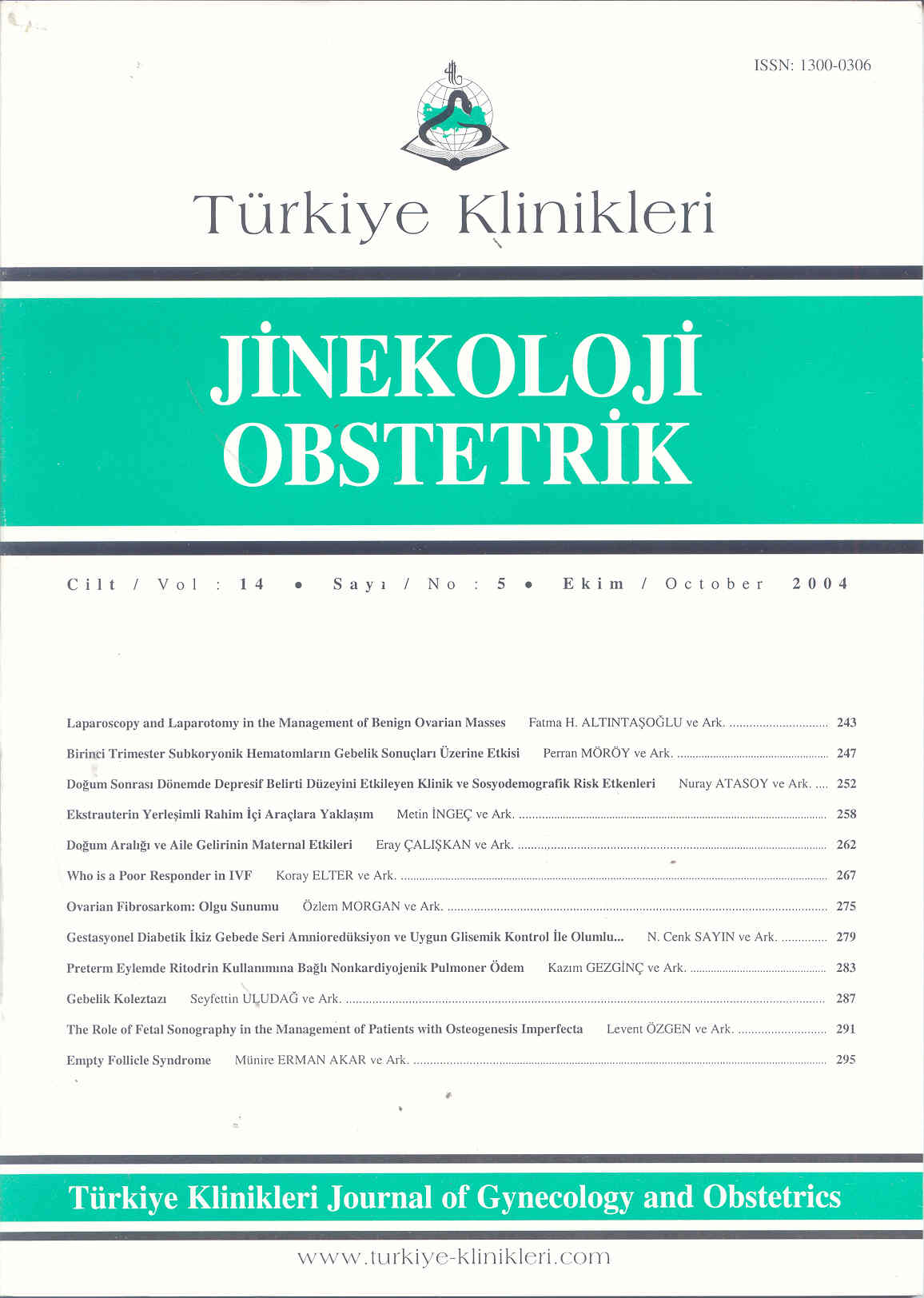Open Access
Peer Reviewed
CASE REPORTS
3901 Viewed2707 Downloaded
Intrahepatic Cholestasis Of Pregnancy
Gebelik Kolestazı
Turkiye Klinikleri J Gynecol Obst. 2004;14(5):287-90
Article Language: TR
Copyright Ⓒ 2025 by Türkiye Klinikleri. This is an open access article under the CC BY-NC-ND license (http://creativecommons.org/licenses/by-nc-nd/4.0/)
ÖZET
Gebelik kolestazı olgularında bir takım fetal risklerin arttığına dikkat çekmek ve bu tip olgularla karşılaşıldığında nasıl bir takip yöntemi izleneceğine açıklık getirmektir. Kliniğimize başvurup gebelik kolestazı tanısı almış olan 2 olgunun klinik ve biyokimyasal bulguları değerlendirilmiş ve gebelik sonuçları gözden geçirilmiştir. Perinatal morbidite ve mortaliteyi etkileyebilecek faktörlerin eşlik edip etmediği araştırılmıştır. Birinci olguda klinik bulguların ve biyokimyasal parametrelerin tedavi ile normale döndüğü ve gebelik sonucunun negatif yönde etkilenmediği gözlenmiştir. İkinci olguda ise tedaviyle her ne kadar klinik ve laboratuar bulgular normale dönse bile mekonyumlu amniotik sıvı varlığı gibi perinatal morbiditeyi etkileyebilecek sonuçların geliştiği tespit edilmiştir. Gebelikte görülen intrahepatik kolestaz artmış fetal risklerle beraber görülebileceğinden fetal iyilik halini belirleyen testlerin düzenli ve normal gebeliklere oranla daha sık aralıklarla uygulanması gerekmektedir.
Gebelik kolestazı olgularında bir takım fetal risklerin arttığına dikkat çekmek ve bu tip olgularla karşılaşıldığında nasıl bir takip yöntemi izleneceğine açıklık getirmektir. Kliniğimize başvurup gebelik kolestazı tanısı almış olan 2 olgunun klinik ve biyokimyasal bulguları değerlendirilmiş ve gebelik sonuçları gözden geçirilmiştir. Perinatal morbidite ve mortaliteyi etkileyebilecek faktörlerin eşlik edip etmediği araştırılmıştır. Birinci olguda klinik bulguların ve biyokimyasal parametrelerin tedavi ile normale döndüğü ve gebelik sonucunun negatif yönde etkilenmediği gözlenmiştir. İkinci olguda ise tedaviyle her ne kadar klinik ve laboratuar bulgular normale dönse bile mekonyumlu amniotik sıvı varlığı gibi perinatal morbiditeyi etkileyebilecek sonuçların geliştiği tespit edilmiştir. Gebelikte görülen intrahepatik kolestaz artmış fetal risklerle beraber görülebileceğinden fetal iyilik halini belirleyen testlerin düzenli ve normal gebeliklere oranla daha sık aralıklarla uygulanması gerekmektedir.
ANAHTAR KELİMELER: İntrahepatik kolestaz, gebelik, fetal riskler
ABSTRACT
Our aim was to take attention to the increased fetal risks observed in intrahepatic cholestasis of pregnancy and to discuss the management of these cases. Clinical symptoms and biochemical values of two cases of intrahepatic cholestasis of pregnancy are presented and pregnancy outcomes are reevaluated. Associated factors increasing perinatal morbidity and mortality are investigated. Clinical and biochemical abnormalities returned to normal and the pregnancy outcome was good in the first patient with proper treatment. In the second case, although the symptoms and the laboratory values regressed with treatment, meconium stained amniotic volume was observed. Fetal risks are increased in intrahepatic cholestasis of pregnancy and in such cases tests showing the fetal well-being should be done more regularly and frequently than normal pregnancies.
Our aim was to take attention to the increased fetal risks observed in intrahepatic cholestasis of pregnancy and to discuss the management of these cases. Clinical symptoms and biochemical values of two cases of intrahepatic cholestasis of pregnancy are presented and pregnancy outcomes are reevaluated. Associated factors increasing perinatal morbidity and mortality are investigated. Clinical and biochemical abnormalities returned to normal and the pregnancy outcome was good in the first patient with proper treatment. In the second case, although the symptoms and the laboratory values regressed with treatment, meconium stained amniotic volume was observed. Fetal risks are increased in intrahepatic cholestasis of pregnancy and in such cases tests showing the fetal well-being should be done more regularly and frequently than normal pregnancies.
MENU
POPULAR ARTICLES
MOST DOWNLOADED ARTICLES





This journal is licensed under a Creative Commons Attribution-NonCommercial-NoDerivatives 4.0 International License.










